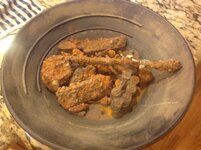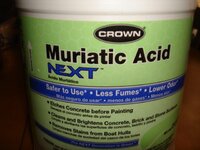KevinInColorado
Gold Member
- Jan 9, 2012
- 7,044
- 11,395
- Detector(s) used
- Minelab Gold Monster 1000, Grizzly Goldtrap Explorer & Motherlode, Gold Cube with trommel or Banker on top, Dream Mat combo sluice, Angus Mackirk Expedition, Gold-n-Sand Xtream Hand pump
- Primary Interest:
- Prospecting
OK guys, easy question...what's the cheapest way to dissolve rust away? This pic is a pan full of rusted junk I've collected while prospecting. As you can see the rust has had time to bind up lots of other stuff. It's going to be too cold to prospect this week so I guess it's time to dissolve the rust to free any gold. Some of this is from a really rich mountain claim but I still want to be smart about this...no point spending $10 to get $5 of gold now is there!?


Upvote
0




 my Coca Cola has to much rum and lime in it to work for this idea! and it would seriously curtail my socially active evening around the campfire!
my Coca Cola has to much rum and lime in it to work for this idea! and it would seriously curtail my socially active evening around the campfire!



